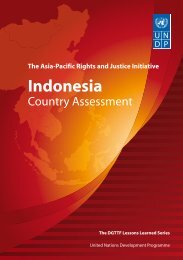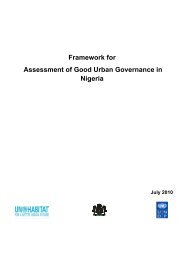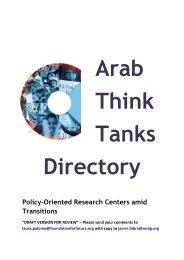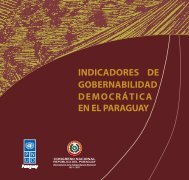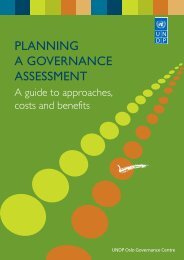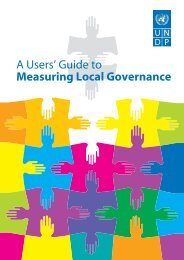English - UNDP
English - UNDP
English - UNDP
Create successful ePaper yourself
Turn your PDF publications into a flip-book with our unique Google optimized e-Paper software.
Specifically, the project was designed to support the preparation<br />
of regional development plans, which reflected local and<br />
regional development priorities. At the same time, links with<br />
the national strategic framework and financial resources were<br />
established.<br />
The second and the third projects are interlinked and it is difficult<br />
to review one without also considering the other. While the two<br />
projects are presented separately, the similarities are evident.<br />
Introduction<br />
Purpose, Scope and Methodology<br />
The Democratic Governance Thematic Trust Fund (DGTTF)<br />
was created in 2001 to provide an opportunity for <strong>UNDP</strong><br />
Country Offices to undertake innovative activities that could<br />
have a catalytic effect in supporting sustainable democratic<br />
governance.<br />
Within a broader range of <strong>UNDP</strong> activities in Tajikistan, the<br />
country office implemented three local governance projects,<br />
funded by the DGTTF, in 2006, 2007 and 2008.<br />
The first project, Clean Start for Local Councils – Building<br />
Accountability at the Local Level, with total DGTTF<br />
contribution of US$200,000, was designed to strengthen the<br />
capacity of local councils to work professionally, transparently<br />
and accountably. In addition, the project supported citizens’<br />
participation in local decision-making processes through the<br />
implementation of citizens’ report cards and the introduction<br />
of a Citizens’ Charter. The project supported the establishment<br />
of participatory planning mechanisms in the pilot districts<br />
embodied in the District Development Councils.<br />
The second project, Building National Capacities for<br />
Implementation of Poverty Reduction Strategies, supported<br />
with US$130,000 funding from DGTTF, was designed to address<br />
development challenges at the district level by establishing<br />
district development plans, and connecting district authorities<br />
to civil society and the private sector. The project also worked<br />
to increase district authorities’ knowledge of budget planning<br />
and financial management, and to enhance capacities for aid<br />
coordination, especially with international donors.<br />
The third project, Building a Framework for Local Planning<br />
and Budgeting, also supported with US$150,000 from the<br />
DGTTF, built on the achievements of the second project.<br />
The purpose of this study is to assess the impact of these<br />
projects within the criteria of effectiveness, efficiency, innovation,<br />
catalytic effect, and sustainability, defined according to these<br />
DGTTF guidelines:<br />
a Relevance – How relevant is the project to the country’s<br />
priority needs, and was the right strategy applied within<br />
the country’s specific political, economic, and social contexts?<br />
a Effectiveness – Effectiveness is a measure of the extent<br />
to which an aid activity attains its objectives.<br />
a Efficiency – Efficiency measures the outputs in relation<br />
to the inputs. Were activities cost-efficient and were objectives<br />
achieved on time?<br />
a Innovation – Innovative projects address recognized<br />
critical democratic governance issues that, if resolved,<br />
may lead to substantial improvements in democratic<br />
governance. They are initiatives, in terms of the problem<br />
addressed or the approach taken, that have never before<br />
been attempted in a given country. And although they<br />
may be potentially risky or less certain of success than traditional<br />
projects, they will position <strong>UNDP</strong> as a key player<br />
in democratic governance, one that ‘pushes the frontier’.<br />
a Catalytic effect – A catalytic project has a high likelihood<br />
of receiving support from government or other governance<br />
institutions (including other donors) for scaling up<br />
or following up, if the project is successful.<br />
a Sustainability – Sustainability is concerned with measuring<br />
whether the benefits of an activity are likely to continue<br />
after donor funding has been withdrawn. Projects<br />
also need to be financially sustainable.<br />
The methodology utilized for this study consists of a preliminary<br />
literature review of all available project documents and reports,<br />
a political economy analysis of the situation in Tajikistan, and a<br />
field visit to Dushanbe and Sughd province.<br />
9



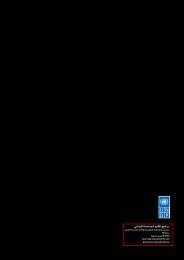
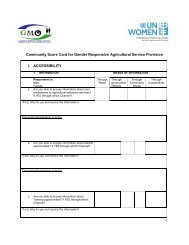

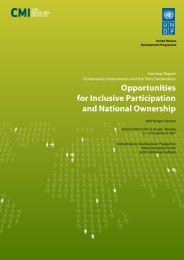
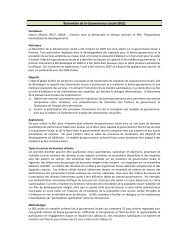
![GuÃa del Usuario ] - Governance Assessment Portal](https://img.yumpu.com/44740603/1/190x253/gua-a-del-usuario-governance-assessment-portal.jpg?quality=85)
